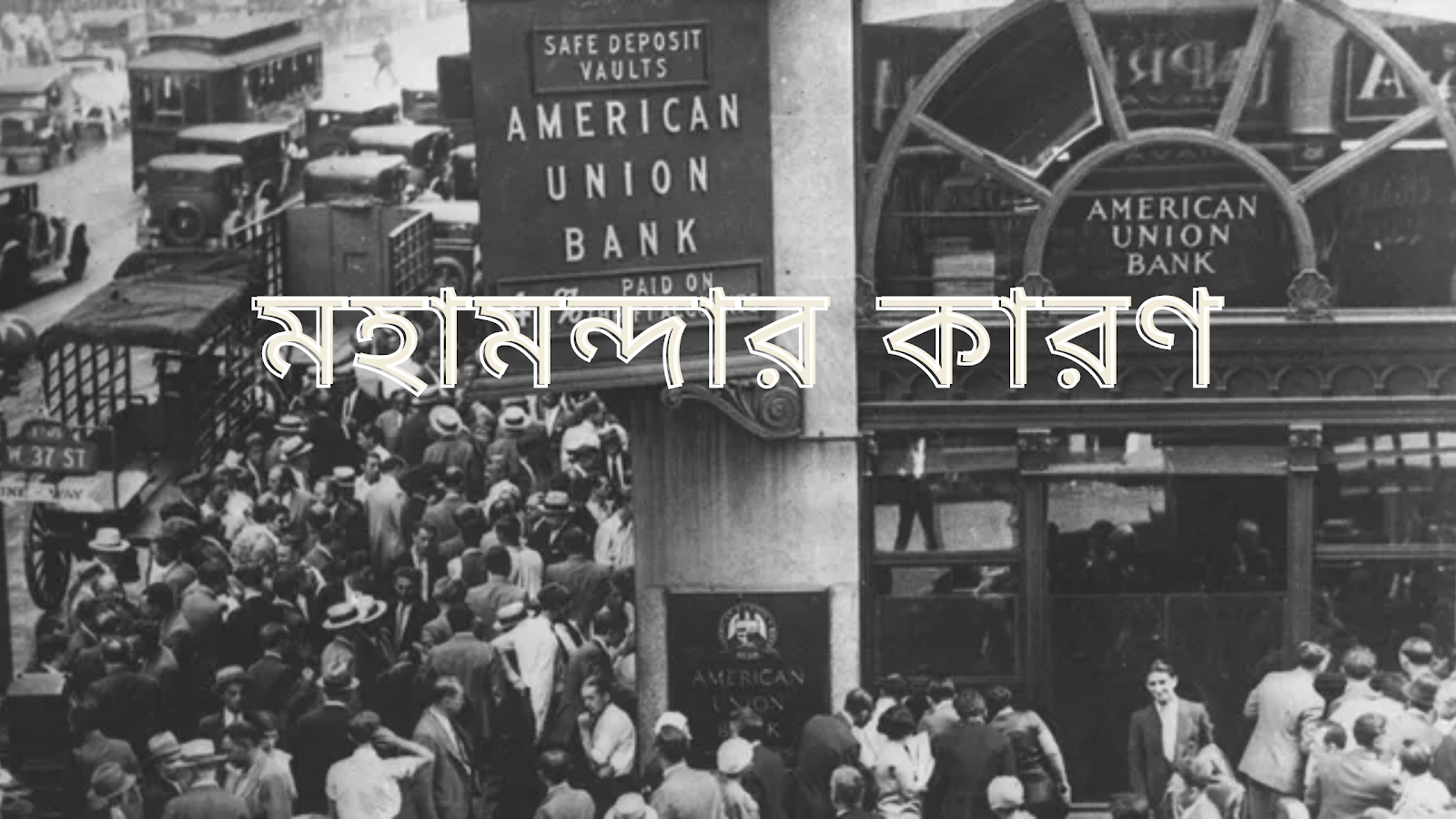Cause of the Great Depression
The Great Depression
was a global economic downturn that began in 1929, lasting until the late
1930s. It is considered the worst economic crisis of the 20th century and one
of the most severe economic crises in modern history. The causes and consequences
of the Great Depression are multifaceted, ranging from financial speculation
and overproduction to government policies and geopolitical tensions. In this
essay, we will examine the causes and consequences of the Great Depression.
One of the main causes
of the Great Depression was the stock market crash of 1929
1. The
1920s had been a period of rapid economic growth and speculation, particularly
in the stock market. However, in October 1929, the stock market crashed,
leading to widespread panic and a loss of confidence in the economy. This event
triggered a series of bank failures and a sharp contraction in economic
activity.
Another cause of the
Great Depression was overproduction, particularly in the agricultural sector.
Advances in technology, such as tractors and fertilizers, had enabled farmers
to produce more crops than ever before, leading to a glut in the market and
falling prices. This resulted in widespread farm closures and an increase in
the number of unemployed farmers.
In addition to these
factors, government policies also played a role in exacerbating the effects of
the Great Depression. One such policy was the uneven distribution of wealth,
with the majority of the country's wealth concentrated in the hands of a few
wealthy individuals. This led to a decrease in consumer spending, which in turn
reduced demand for goods and services, exacerbating the downturn.
The global nature of
the Great Depression also had significant geopolitical consequences. The
economic crisis led to political instability around the world, particularly in
Europe. Governments were forced to implement austerity measures to counter the
effects of the downturn, leading to the rise of authoritarian regimes in
countries such as Germany and Italy.
In the United States,
the consequences of the Great Depression were severe. Unemployment rates
reached record highs, with some estimates suggesting that as many as one in
four Americans were out of work. Widespread poverty and homelessness became
commonplace, with many families forced to rely on charity or government
assistance to survive.
In response to the
crisis, governments around the world implemented a series of policies aimed at
stabilizing the economy. In the United States, President Franklin D. Roosevelt
introduced the New Deal, a series of programs aimed at providing relief to the
unemployed, stimulating economic growth, and regulating financial institutions.
These policies were successful in reducing the severity of the crisis, but it
was not until the
মহামন্দার কারণ
গ্রেট ডিপ্রেশন ছিল একটি বিশ্বব্যাপী অর্থনৈতিক মন্দা যা
1929 সালে শুরু হয়েছিল, 1930 এর দশকের শেষ পর্যন্ত স্থায়ী ছিল। এটিকে 20 শতকের সবচেয়ে
খারাপ অর্থনৈতিক সংকট এবং আধুনিক ইতিহাসের সবচেয়ে গুরুতর অর্থনৈতিক সংকট হিসেবে বিবেচনা
করা হয়। মহামন্দার কারণ ও পরিণতি বহুমুখী, আর্থিক জল্পনা-কল্পনা এবং অতিরিক্ত উৎপাদন
থেকে শুরু করে সরকারি নীতি এবং ভূ-রাজনৈতিক উত্তেজনা। এই প্রবন্ধে, আমরা মহামন্দার
কারণ এবং ফলাফলগুলি পরীক্ষা করব।
মহামন্দার অন্যতম প্রধান কারণ ছিল 1929 সালের স্টক মার্কেট
ক্র্যাশ
1. 1920 এর দশক ছিল দ্রুত অর্থনৈতিক প্রবৃদ্ধি এবং অনুমানের
সময়, বিশেষ করে স্টক মার্কেটে। যাইহোক, 1929 সালের অক্টোবরে, স্টক মার্কেট বিপর্যস্ত
হয়, যার ফলে ব্যাপক আতঙ্ক ছড়িয়ে পড়ে এবং অর্থনীতিতে আস্থা হারায়। এই ঘটনাটি ব্যাংক
ব্যর্থতার একটি সিরিজ এবং অর্থনৈতিক কার্যকলাপে একটি তীক্ষ্ণ সংকোচনের সূত্রপাত ঘটায়।
মহামন্দার আরেকটি কারণ ছিল অতিরিক্ত উৎপাদন, বিশেষ করে
কৃষি খাতে। প্রযুক্তিতে অগ্রগতি, যেমন ট্রাক্টর এবং সারের, কৃষকদেরকে আগের চেয়ে অনেক
বেশি ফসল উৎপাদন করতে সক্ষম করেছে, যার ফলে বাজারে একটি আধিপত্য দেখা দিয়েছে এবং দাম
কমছে। এর ফলে ব্যাপকভাবে খামার বন্ধ হয়ে যায় এবং বেকার কৃষকের সংখ্যা বৃদ্ধি পায়।
এই কারণগুলি ছাড়াও, সরকারী নীতিগুলিও মহামন্দার প্রভাবকে
বাড়িয়ে তুলতে ভূমিকা পালন করেছে। এরকম একটি নীতি ছিল সম্পদের অসম বণ্টন, যেখানে দেশের
সিংহভাগ সম্পদ কিছু ধনী ব্যক্তির হাতে কেন্দ্রীভূত ছিল। এটি ভোক্তাদের ব্যয় হ্রাসের
দিকে পরিচালিত করে, যার ফলে পণ্য ও পরিষেবার চাহিদা হ্রাস পায়, মন্দাকে আরও বাড়িয়ে
তোলে।
মহামন্দার বৈশ্বিক প্রকৃতিরও উল্লেখযোগ্য ভূ-রাজনৈতিক ফলাফল
ছিল। অর্থনৈতিক সংকট সারা বিশ্বে, বিশেষ করে ইউরোপে রাজনৈতিক অস্থিতিশীলতার দিকে পরিচালিত
করে। সরকারগুলিকে মন্দার প্রভাব মোকাবেলায় কঠোরতা ব্যবস্থা বাস্তবায়ন করতে বাধ্য
করা হয়েছিল, যার ফলে জার্মানি এবং ইতালির মতো দেশে কর্তৃত্ববাদী শাসনের উত্থান ঘটে।
মার্কিন যুক্তরাষ্ট্রে, মহামন্দার পরিণতি গুরুতর ছিল। বেকারত্বের
হার রেকর্ড উচ্চতায় পৌঁছেছে, কিছু অনুমানে বলা হয়েছে যে চারজনের মধ্যে একজন আমেরিকান
কাজের বাইরে ছিলেন। ব্যাপক দারিদ্র্য এবং গৃহহীনতা সাধারণ হয়ে উঠেছে, অনেক পরিবার
বেঁচে থাকার জন্য দাতব্য বা সরকারী সহায়তার উপর নির্ভর করতে বাধ্য হয়েছে।
সংকটের প্রতিক্রিয়া হিসাবে, বিশ্বজুড়ে সরকারগুলি অর্থনীতিকে
স্থিতিশীল করার লক্ষ্যে একাধিক নীতি প্রয়োগ করেছে। মার্কিন যুক্তরাষ্ট্রে, রাষ্ট্রপতি
ফ্র্যাঙ্কলিন ডি. রুজভেল্ট নতুন চুক্তি প্রবর্তন করেছিলেন, বেকারদের ত্রাণ প্রদান,
অর্থনৈতিক প্রবৃদ্ধিকে উদ্দীপিত করা এবং আর্থিক প্রতিষ্ঠানগুলিকে নিয়ন্ত্রণ করার লক্ষ্যে
একটি ধারাবাহিক কর্মসূচি। এই নীতিগুলি সঙ্কটের তীব্রতা কমাতে সফল হয়েছিল, তবে তা ২০১০
সাল পর্যন্ত হয়নি






No comments:
Post a Comment